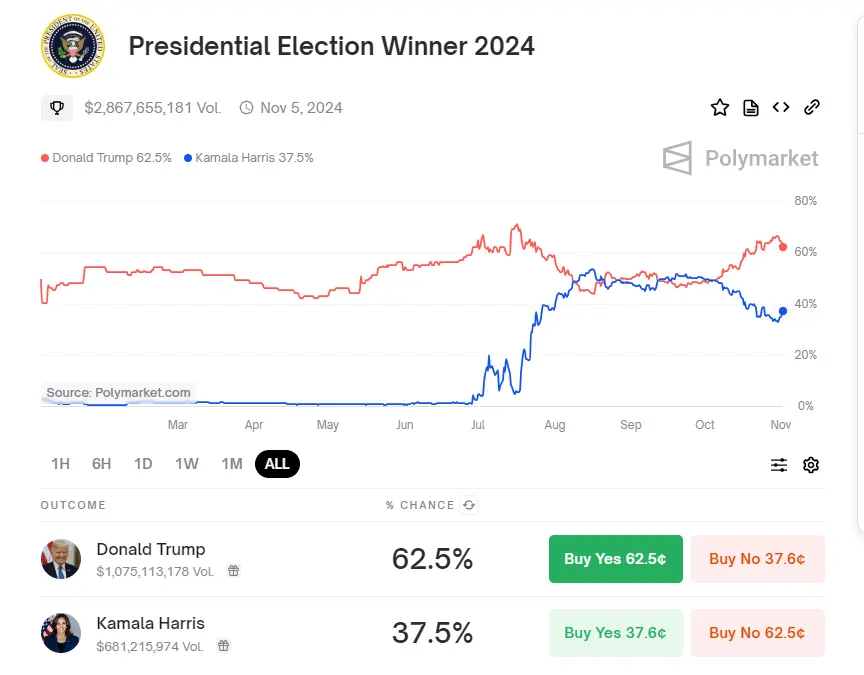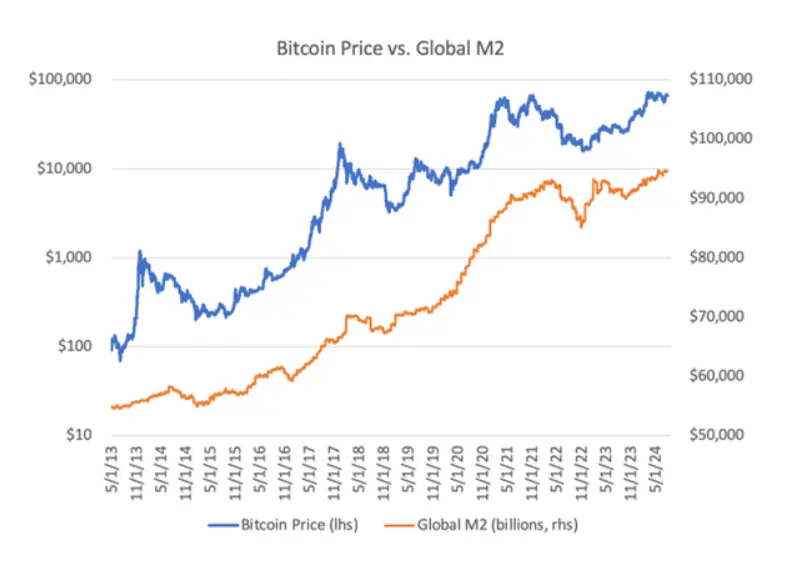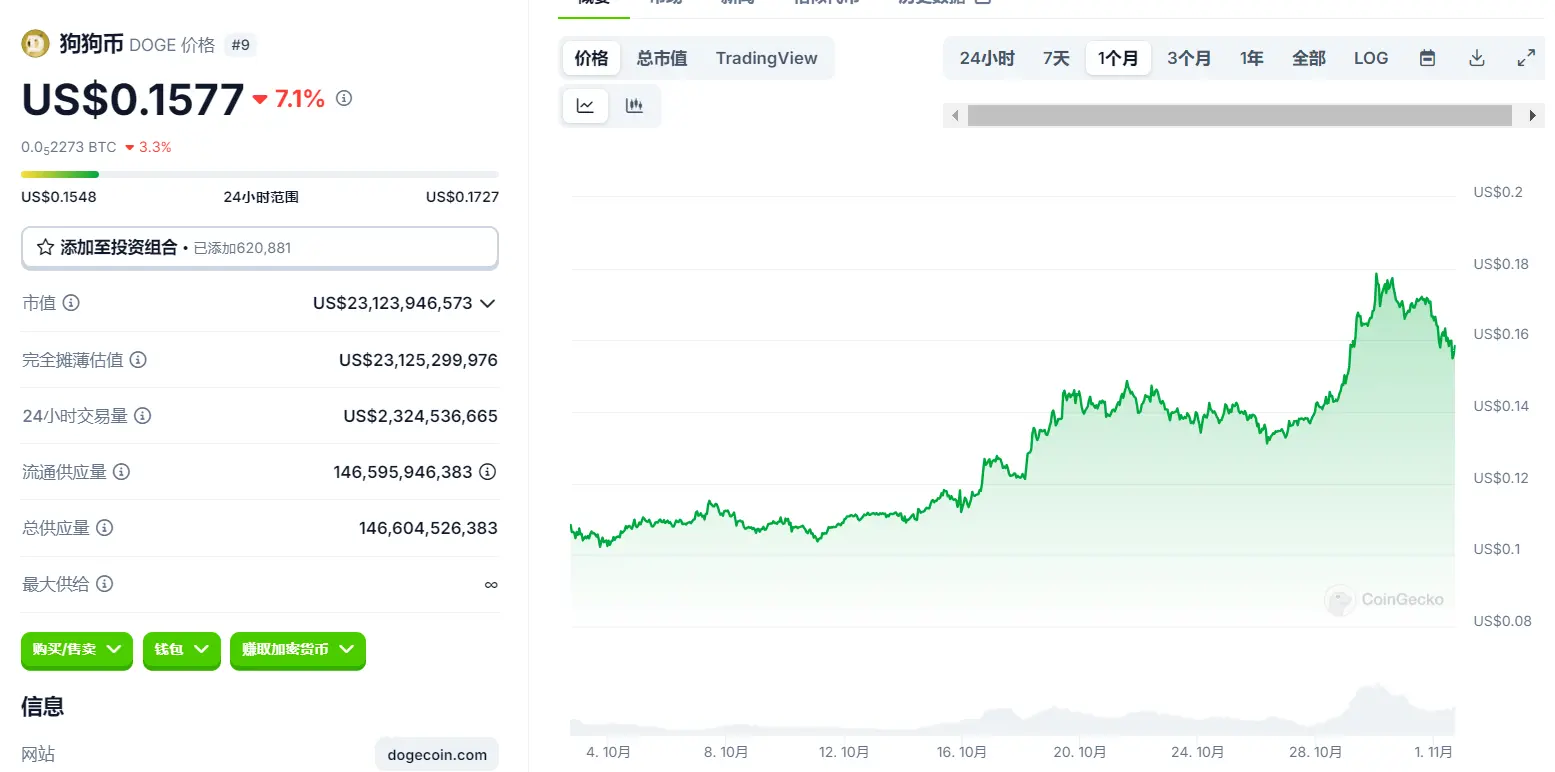Author: Alvis, Mars Finance
As the 2024 US election approaches, the tension in the capital market has reached a critical point, and the cryptocurrency market is even more nervous. This year, Trump, who has experienced a life-and-death crisis, ran a high-profile campaign, and his bold statement of "making the United States the capital of crypto" instantly ignited the enthusiasm of the crypto community. However, history has repeatedly reminded us that subtle changes in policies often become watersheds in the market.
Looking back at the "New Deal" after Roosevelt came to power in 1933, overnight, the economic rules of the United States were completely reshaped, a large number of companies were forced to adapt to the new policy direction, and the market structure was reshuffled and reorganized. This time, the cryptocurrency industry may be facing the same fate. As Harris steadily advances in the campaign, her highly consistent policy stance with Biden means that the current government's anti-crypto regulation may continue to increase. For a crypto market that advocates freedom and decentralization, this policy direction may be a real test of life and death.
So, if Harris is elected, what will be the future of cryptocurrency? What opportunities can we expect? We will conduct an in-depth analysis with these questions in mind.

According to the forecasting website Polymarket, Trump's chance of winning is currently 62.5%, while Harris's chance of winning is only 37.5%. Although the forecast market believes that Trump has a higher chance of winning, a Forbes poll on October 31 showed that Harris leads Trump by a narrow margin of 1% nationwide, and 10% of voters may change their positions before the election.
In the seven key swing states that will decide the outcome of the election, Harris's approval rating is 49%, slightly ahead of Trump's 48%. Just a week ago, Trump led Harris in these states 50% to 46%.
Therefore, even though many crypto supporters prefer Trump’s election, Harris may still succeed.
The presidents who were not favored in history but eventually overtook the odds
There have been many cases in American history where candidates who were not favored at the beginning of the campaign, or even underestimated by poll data, eventually made a successful comeback.
In 1948, Truman was one of them. Polls showed that he was behind Republican candidate Thomas Dewey. The media and polling agencies even announced Dewey's victory in advance, and some newspapers printed the headline "Dewey defeats Truman". However, Truman adopted a series of intensive campaign activities, directly targeting voters, emphasizing the achievements of the Democratic Party in economic and social policies, and finally won the election. This election is considered a classic case of inaccurate polls.
In 1992, Clinton was not a popular candidate in the Democratic Party. He suffered a slump in the early stages of the campaign due to a series of negative reports and scandals. Many experts predicted that he would have a hard time making it to the end. However, due to his flexible campaign strategy, ability to communicate with the people, and the economic difficulties at the time, he gradually gained support. In the end, he defeated then-President George H. W. Bush and third-party candidate Ross Perot in a three-way race and was successfully elected.
In 2016, Trump himself also staged a big reversal. When he ran for election, he was not only regarded as a "hopeless" candidate in the Republican primary, but was also seriously underestimated by mainstream polls in the final election against Hillary Clinton. During the campaign, Trump won the support of a large number of voters with his strong populist style and appeal to the middle and lower classes of the United States, especially in swing states, and finally won the election.
From this point of view, it is important not to draw conclusions before the voting results are actually announced. Just like Bitcoin encountered a black swan event when it was at its peak, no one can predict the final result of the election in advance.
Harris's election: a disaster or a market correction? Market opinions are polarized
First of all, we have to admit that if Harris is elected, there is a high probability that she will continue the policy tone of the Biden era. At this moment, cryptocurrency investors are feeling a bit like a roller coaster.
Analysts at the well-known analytical firm Bernstein have predicted that if Harris wins, the price of Bitcoin may fall significantly by the end of the year, perhaps even falling by 10%.
On the other hand, Crypto Rand, a veteran cryptocurrency trader, is much calmer. He believes that no matter who enters the White House, the general direction of the crypto market will not change, and the bull market will eventually come, but there may be some bumps on the road.
So, there are two key points here: first, Biden-style policies are unfriendly to cryptocurrencies, and second, the market is speculating whether Harris will increase regulation, which will lead to greater uncertainty.
Even so, Crypto Rand said that Bitcoin may bottom out and rebound in 2025, driving the entire market towards a new round of bull market. These predictions are not groundless, because whether it is Bitcoin or altcoins, the ups and downs of the crypto market have long become the norm. For some staunch supporters, this is just a short-term fluctuation and does not represent a reversal of the overall trend.
Continuity of regulatory policy: Gary Gensler’s “enforcement supervision” and the Biden administration’s regulatory path
We need to deeply understand how the Biden administration treats cryptocurrencies so that we can more accurately predict Harris' policy direction. Since Biden took office, the U.S. Securities and Exchange Commission (SEC) has started the "enforcement and supervision" mode under the leadership of current Chairman Gary Gensler, especially for the cryptocurrency industry, which can be said to be ruthless. The SEC not only filed lawsuits against large exchanges such as Binance and Coinbase, but also thoroughly tracked down unregistered cryptocurrency securities. It is generally believed in and out of the market that Gensler's regulatory approach has obvious high-pressure characteristics. He has become the "guardian of order" in the crypto market on his own, but his methods have also caused a lot of controversy, and some people even accuse him of being a "disruptor" in the market.
The following is a chronological review of some of the regulatory bills and enforcement actions during Biden's term from the beginning of 2021 to 2024:
2021
March: The Financial Crimes Enforcement Network (FinCEN) under the U.S. Treasury Department proposed a proposal to strengthen anti-money laundering (AML) and “know your customer” (KYC) requirements for cryptocurrencies, aiming to curb the use of cryptocurrencies in illegal activities.
August: The Commodity Futures Trading Commission (CFTC) filed a lawsuit against cryptocurrency trading platform BitMEX, alleging that it failed to implement appropriate anti-money laundering and KYC measures. Eventually, BitMEX agreed to pay a $100 million fine and reached a settlement with the CFTC.
2022
February: The SEC filed a lawsuit against crypto lending platform BlockFi, alleging that it failed to register its yield account product as a security. Ultimately, BlockFi agreed to pay a $100 million fine.
March: President Biden signs an executive order on digital assets, requiring federal agencies to coordinate the development of a regulatory framework for cryptocurrencies aimed at protecting consumers, maintaining financial stability, combating illicit activity, and exploring the possibility of a U.S. central bank digital currency (CBDC).
June: The U.S. Department of Justice established the National Cryptocurrency Enforcement Team, which was involved in a number of cases shortly after its establishment, including tracking down the cryptocurrency assets of the Silk Road illegal trading platform and assisting in tracking the illegal transfer of international crypto assets.
September: The U.S. Treasury Department released three reports on digital assets, focusing on the risks of cryptocurrencies in illicit finance, consumer protection, and payment systems, further clarifying the government’s regulatory stance on cryptocurrencies.
October: The SEC began investigating Yuga Labs’ NFT project Bored Ape Yacht Club (BAYC) due to concerns that its tokens may involve unregistered securities sales.
December: After the FTX bankruptcy, the CFTC, SEC, and Department of Justice jointly launched an investigation into FTX to determine whether it had abused customer funds, illegally misappropriated funds, and engaged in fraud.
2023
May: A bipartisan group of U.S. Congress members introduced the Cryptocurrency Tax Fairness Act, proposing to implement a capital gains tax exemption on small transactions to promote the daily use of cryptocurrencies and ensure that the industry is not suppressed by a complicated tax system.
August: The SEC filed a lawsuit against major cryptocurrency exchanges Binance and Coinbase, alleging that they were not registered as securities exchanges and that some of their crypto assets were considered unregistered securities. The SEC's action was seen as a comprehensive cleanup of the cryptocurrency market, especially imposing stricter compliance requirements on trading platforms that did not comply with securities laws.
September: The Biden administration expressed its intention to further review all crypto assets that use the Proof of Stake (PoS) mechanism and intend to define them as securities. The SEC began to strengthen its supervision of PoS assets such as Ethereum, saying that they are similar to the voting rights structure of traditional stocks and may need to comply with securities laws.
November: Binance agrees to pay a $4.3 billion fine to settle a multi-year U.S. government investigation. Binance admits to engaging in suspected money laundering, unlicensed money transmission, and sanctions violations. At the same time, founder Changpeng Zhao (CZ) admits to failing to maintain an effective anti-money laundering program and resigns as CEO.
2024
April: Zhao Changpeng was sentenced to four months in prison by a federal court in Seattle for violating US anti-money laundering laws (he has now been released).
May: The U.S. House of Representatives passed the 21st Century Financial Innovation and Technology Act (FIT21), laying the legal foundation for the regulation of digital assets and further clarifying the regulatory responsibilities of the Commodity Futures Trading Commission (CFTC) and the U.S. Securities and Exchange Commission (SEC), especially in the management and supervision of crypto assets and digital financial products. The FIT21 Act is regarded as an important foundation for the federal regulatory framework for digital assets.
June: The U.S. Treasury Department issued a final rule requiring all cryptocurrency platforms to report user transaction details to the U.S. Internal Revenue Service (IRS) starting in 2026, with the aim of tightening regulation of cryptocurrencies in the tax field and reducing tax evasion.
These events and bills undoubtedly show that the Biden administration's attitude towards cryptocurrencies is generally biased towards strong regulation. Under the leadership of Gary Gensler, the SEC has adopted an "enforcement supervision" approach, bringing the cryptocurrency industry into a stricter legal framework and requiring market participants to comply with compliance standards.
It is worth noting that Gary Gensler's future role is currently undecided. Although Trump has promised to fire Gensler on "Day 1" if elected, legally he cannot directly decide whether the SEC chairman stays or leaves. Harris has not yet made an official statement on Gensler's re-election, and market analysts generally believe that Gensler's "enforcement and supervision" strategy may encounter resistance.
Well-known cryptocurrency analyst Crypto Rand bluntly stated that Gensler's policy is "the biggest burden on the U.S. cryptocurrency industry."
Rashan Colbert, policy director of dYdX, a U.S. decentralized trading platform, also pointed out that if the new government can replace the SEC chairman, it will mark the end of law enforcement overreach and harmful regulation, and may help the compliance development of the crypto market.
Billionaire investor Mark Cuban also expressed doubts about Gensler's law enforcement approach. He believes that Harris' team tends to oppose the "law enforcement and regulation" model and hopes to promote the development of the crypto market through a clear regulatory framework.
Cuban said Harris "prefers clear regulation rather than litigation," an approach that would save companies from having to move their apps overseas.
Other industry observers believe that even if Harris replaces Gensler, the enforcement of the cryptocurrency market will not weaken. Venture capitalist Tim Draper went further and called for a thorough update of U.S. securities laws, pointing out that the current Howey rules were established 80 years ago and are no longer adapted to the "dynamic, growing modern market environment." The real turning point lies in whether more transparent and clear regulations can reduce industry uncertainty. This is of great concern in the market because a clear regulatory framework can help companies and investors make more stable layouts, rather than feeling like they are walking a tightrope every time a policy is released.
Global liquidity and market opportunities: Will loose monetary policy become a driving force for the bull market?
Bit Mining chief economist Yang Youwei noted that if Harris is elected, cryptocurrency investors should pay special attention to monetary liquidity in the global economy.
Here is the key point: Will the so-called "hot money" flow into the crypto market again and become a catalyst for a new round of bull market? Yang Youwei's point is clear: the looser the monetary policy, the greater the possibility of capital flowing into the crypto market. Considering the current uncertainty of the global economy and the loose policies generally adopted by central banks of various countries, the inflow of hot money may indeed bring more market opportunities.

Correlation between Bitcoin price and global liquidity. Source: Lyn Alden
Another person who supports this view is cryptocurrency entrepreneur Erik Finman. He believes that if the Fed takes a more accommodative stance under Harris, then even if regulatory challenges exist, increased market liquidity will still support prices. In other words, the further Harris's policy goes on the road of "loose money", the greater the bull market potential of the crypto market.
However, all this is premised on whether the United States can withstand greater inflationary pressure. It is foreseeable that if Harris attempts to continue to implement loose policies, he will inevitably encounter considerable fiscal pressure and market resistance. In this case, companies and investors must be wary of the volatility risks in the crypto market and should not easily ignore the chain reaction brought about by monetary policy.
Lack of clear policy sparks panic: Will the US crypto industry be ‘geo-fenced’?
For many crypto market participants, a major flaw of Harris is her vague attitude towards cryptocurrencies. In September of this year, Harris publicly stated for the first time that her government would encourage investment in artificial intelligence and digital assets to maintain the competitiveness of the United States. However, it is obvious that such a statement lacks details and cannot reassure the market at all. This ambiguity has caused many people to worry that she may continue Biden's hard line, thereby increasing market uncertainty.
Venture capitalist Tim Draper pointed out that "fear" has begun to spread in the industry at this stage, especially for small crypto companies that are more sensitive to uncertainty. Instead of hesitating on the regulatory policies of the United States, more and more companies choose to go overseas directly to seek a clearer policy environment. At present, the policies of countries such as Dubai and Singapore are more relaxed and clear than those of the United States, and the "geo-fencing" phenomenon in the United States is emerging.
Colbert, policy director of the well-known decentralized platform dYdX, further added: "Other countries are moving faster than the United States, and this trend will continue if the new US government is unwilling to remain competitive in the field of cryptocurrency." Even if the Harris administration relaxes policies in some aspects in the future, the lack of systematicity and clarity will inevitably push innovators to a more inclusive market.

The top 10 countries in the Henley Cryptocurrency Adoption Index 2024. Source: Henley & Partners
The Henley Cryptocurrency Adoption Index 2024, released by investment immigration consulting firm Henley & Partners, ranked the cryptocurrency adoption status of different countries, ranking the United States behind the United Arab Emirates, Hong Kong and Singapore.
Still, most of the big cryptocurrency companies haven’t left the U.S. Despite the unfriendly attitude of regulators over the past few years, the U.S. market is simply too tempting for many crypto businesses to leave.
Therefore, if Harris is elected president, the market will obviously need clear and strong policy signals to stabilize investors' confidence. The current chairman of the U.S. Securities and Exchange Commission has caused widespread controversy with his tough regulatory approach. The market generally expects that Harris may select a new leader after taking office to ease the industry's dissatisfaction.
But the real challenge is whether the Harris administration can find the ideal balance - protecting the basic security of the market while promoting the vigorous development of the industry. Under a looser monetary policy, if a stable policy environment can be provided, the potential of the crypto market will undoubtedly be released.
Dogecoin and Elon Musk in the volatile market
In the turbulent world of cryptocurrency, Dogecoin has always been an "outlier". Unlike mainstream crypto assets such as Bitcoin and Ethereum, Dogecoin is not only highly volatile, but also has a playful and self-deprecating temperament. Who would have thought that this cryptocurrency, which was originally a joke, would set off a global craze under the leadership of Musk. And this "shouting king" Musk has long become the spokesperson for Dogecoin. Whether it is personal tweets or Tesla's income and expenditure management, he has frequently brought Dogecoin into the mainstream vision, and used his personal influence to open up a road for this niche project.

Dogecoin has risen by as much as 80% in the past month
So here comes the question: If Trump wins the 2024 US election and Musk is in charge of the so-called "Department of Government Efficiency" (DOGE), the Dogecoin market will undoubtedly be more lively. But what if Trump loses and Harris is elected?
Harris’ policy stance has always been vague, which is not good news for the cryptocurrency market, especially for highly emotional Dogecoin investors.
Cryptocurrency analyst Crypto Rand predicts that if Harris is successfully elected, market panic may spread rapidly. Since Dogecoin investors tend to be more short-term sentiment-driven, once the policy is unclear, the market may enter a short-term selling mode. In other words, the price of Dogecoin is likely to experience a "free fall", and if this panic is not dissipated in time, it will bring deeper market fluctuations.
Musk: Standing with Trump and his "puppet theory" about Harris
Having said that, Musk's own performance in this election is also very eye-catching. As a "shouting king" in the technology circle who dares to speak out and act, he clearly stood on Trump's side this year and even spent millions of dollars to support his campaign. By setting up a lottery with high prize money, he intends to encourage more voters to participate in the vote, especially in key states where the election is deadlocked. The Tesla CEO not only spoke out through his social media influence, but also directly supported the campaign through the US Political Action Committee (PAC), and spared no effort to stand on Trump's side.
More topical is Musk's view on Harris. In public, Musk has mercilessly called Harris a "puppet" and said that Harris does not have real decision-making power. In his remarks, Harris is considered a "front-stage puppet" - a political tool who lacks substantive decision-making power. Musk's behavior as one of the top richest people in the United States is extremely rare in American history, so Musk can't help but have that "heartfelt words" - if Trump fails this time, I may be arrested and lose everything I have.
Dogecoin market's "emotional panic" and future risks
Compared with Bitcoin and Ethereum, the market structure of Dogecoin is more dependent on sentiment. Once investor confidence is unstable, it is very easy to form a large-scale sell-off. In the past, with Musk's support, the price of Dogecoin tended to fluctuate rapidly in a short period of time, but if Harris comes to power and the policy is unclear, whether Musk's influence can be maintained remains a question mark.
Especially now that Tesla’s third-quarter financial report has come out, its financial performance has gradually stabilized, and its Bitcoin holdings have remained unchanged, whether Musk’s enthusiasm for Dogecoin will be affected by the political situation has also become a focus of market attention.
If Trump loses the election, Musk will face a sharp rise in political pressure, and his personal activity in the cryptocurrency market may be greatly reduced. This is obviously not good news for Dogecoin. After all, Musk's support is an important reason for Dogecoin to frequently appear on the screen in the public eye. Once his shouting effect fades, the price of Dogecoin may enter a period of emotion-driven volatility, and even create a risk of further decline.
Conclusion: Unclear policies + market turmoil, Dogecoin needs to be wary of a "double blow"
In general, the unclear policies after Harris's election, the risk factors of Musk's support for Trump, and the instability of investor sentiment have made the future of Dogecoin confusing. The future of Dogecoin is likely to be torn between Harris's policy tone and Musk's personal influence. For investors, especially short-term speculators, they must be vigilant about changes in market sentiment and not easily chase ups and downs to avoid falling into unnecessary risks.
In short, the 2024 election will not only determine the American political landscape for the next four years, but may also become a watershed in the fate of Dogecoin and Musk.
Future Outlook: If Harris is really elected president, will it reshape the crypto market?
There are only four days left until the US election day. Regardless of who enters the White House, volatility in the crypto market is probably inevitable. In the short term, strict policy control or monetary easing will only be a peak or trough in the market wave; in the long run, the direction of the crypto market will not change, but the road will become more tortuous and unpredictable.
As for where the future of cryptocurrency will go, I'm afraid only God knows.















